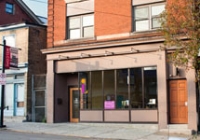CLP-Pop Up/Allentown Learning & Engagement Center
Carnegie Library of Pittsburgh, Pa.
Innovation Synopsis
The CLP-Pop Up is an extended outreach project, embedding librarians in a rented storefront in an underserved community. Through this project, the Library fostered a partnership with an established community nonprofit to cooperatively continue operation of the Pop Up, now Allentown Learning and Engagement Center (ALEC), as a community center.
Challenge/Opportunity
The Library identified, though the community engagement and planning process surrounding the 2013-17 strategic plan, community outreach to underserved communities as a priority. Additionally, the Library’s newly established Library in Your Neighborhood, Community, and Schools (LYNCS) department was tasked with experimenting with new service models, building on the success of an 18-month long Pop Up Library installed in the Pittsburgh Public Market.
The combination of a low level of engagement with the Library by residents, and a densely populated community with a central business district and active community corporation made the Allentown/Beltzhoover section of Pittsburgh an ideal choice for a larger scale embedded outreach project, the goals of which were to:
- Learn from community members how the Library can better serve this community
- Experiment with a blended service model combining elements of a library with elements of a community center
- Provide access to technology and library collections to a community in need of services
- Develop and mend relationships between the Library and members of this community
Key Elements of Innovation
Our key innovation was an approach to library service that focused on sharing responsibilities with community, learning through partnerships, collaborative programs, experimentation with nontraditional library services, and an ability to be responsive to community need and adapt services as lessons were learned.
To create a community culture of shared responsibility for library services, we worked from the start with many stakeholders – city government, nonprofits, neighborhood leaders, and businesses in the business district. This tied outcomes to the actions of the entire community rather than the library working independently. Because the goals of the Pop Up were different from that of a traditional branch, staff were empowered to be flexible in the application of policy and other decisions. Our customer service priority centered not on our collection but instead on removing barriers to access so that when our temporary service point ended, our customers could continue to use permanent branches. Toward this goal, we worked with regular users to resolve fines and any other issues that were preventing their use of a library card. Technology was available to anyone, regardless of library card status, and printing and photocopying were free; users were educated about policies at other libraries.
We also employed a nimble approach to programming – as staff gained experience doing children’s, teen, and adult programs in this environment, we learned that scheduled programs were often not well attended. Staff responded by preparing programs and having them ready for a time when a program was needed, for instance when a large number of unattended children were present and eager to do something creative. This enabled us to introduce library programming to a new audience.
Achieved Outcomes
The key outcome of this project has been the development of a full partnership with a local nonprofit to continue operation of a community center in this space. The Brashear Association, which provides social services and educational support to communities in southern Pittsburgh, has entered into a partnership to jointly operate the Allentown Learning and Engagement Center as a community center and drop-in afterschool and summer program, through March 2015.
CLP staff will continue to provide information service, reader’s advisory, programming and technology assistance through summer 2014. This partnership demonstrates that an established and influential nonprofit saw the value in operating a community center in this location, and ensures that the families that have made use of the Pop Up will continue to have access to needed services.
The Library has also learned some lessons that can be considered in future revisions of policies;
- Flexible programming can garner good attendance and engagement from previously reluctant users.
- There is an unmet demand for access to technology and collections by users who have barriers, whether real or perceived, to access to traditional libraries.
Additionally, CLP nurtured relationships with many non-library users in this community and cleared the way for them to continue their relationship with the Library at nearby branch locations. Through education about library services, repair of delinquent library card accounts, and personal relationships with community members, we are assured that the impact of this project will extend beyond the life of the Pop Up Library itself.

